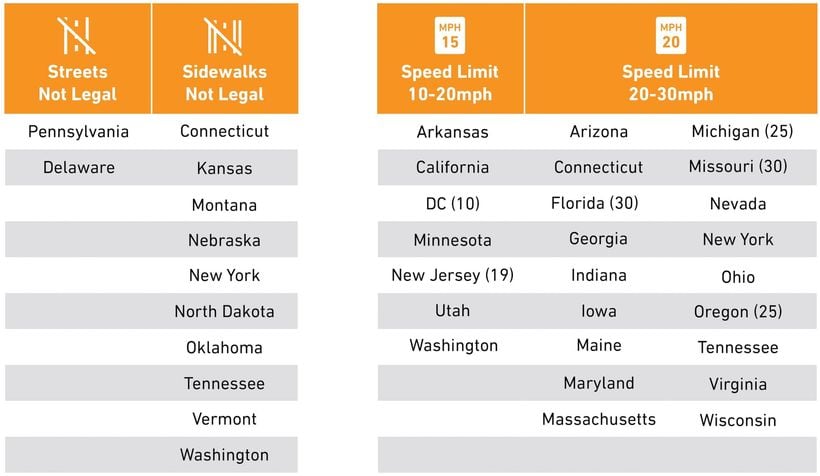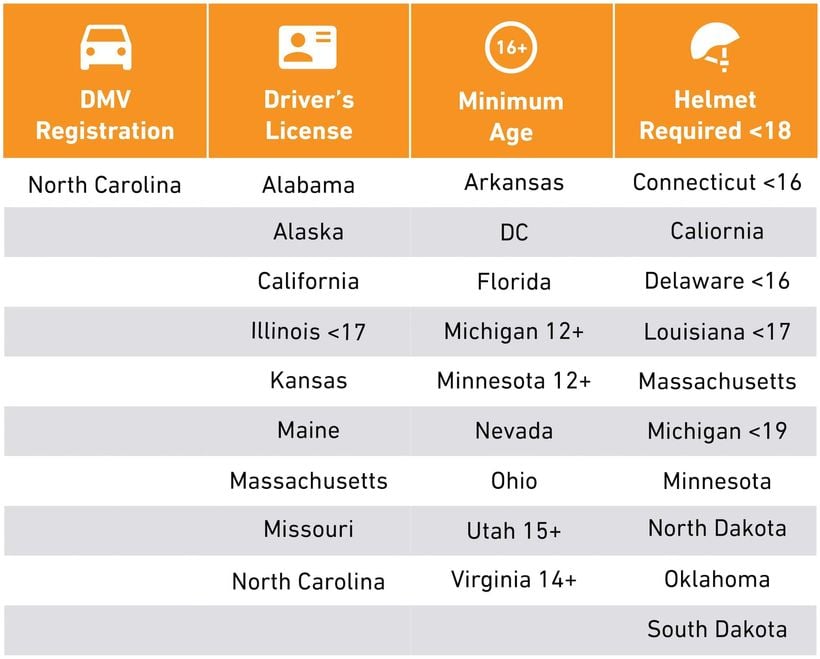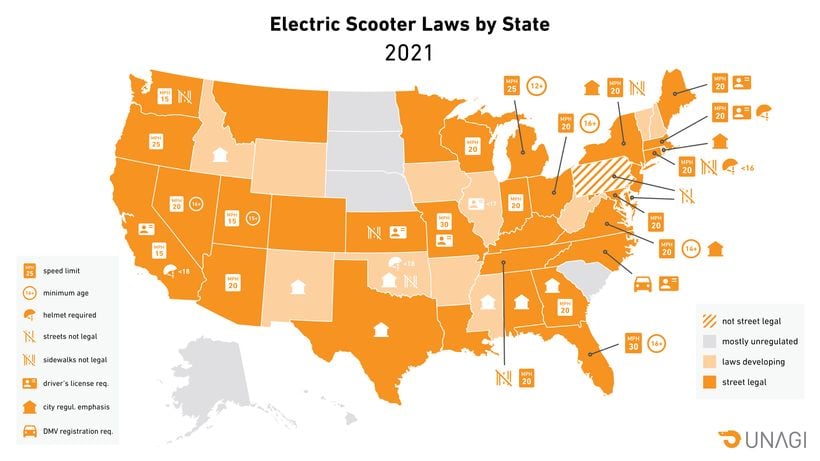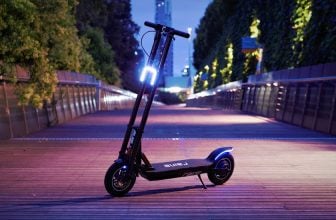Electric Scooter Laws: Comprehensive Guide
November 2, 2022
“Are electric scooters legal?”
Well..it depends. This question is asked time again and with the electric scooter industry on the rise, regulation is hard to keep up with…until now.
Unagi, best known for the Model One with its beautiful finish, tactile refinement, and ultra-stylish command center, has released a new electric scooter laws guide that breaks down everything you need to know.
To make it easy for you, we’ve compiled a definitive list of the key takeaways, categorized into 3 groups:
- Where and how you can ride – sidewalks, streets, and maximum speeds
- Rider regulations – (registrations, licenses, minimum ages, and helmet requirements)
- Laws by U.S. state – (in alphabetical order)
Where and How You Can Ride

Streets
- Street riding is banned in 2 states (including Pennsylvania and Delaware)
- In almost all cases, scooters are not allowed on streets that have a speed limit above 35 mph
Sidewalks
- Sidewalk riding is banned in 10 states (including Connecticut, Wisconsin, Montana, Nebraska, New York, North Dakota, Oklahoma, Tennessee, Vermont, and Washington)
Speed Limits
- Florida and Missouri requires electric scooters have a speed limit of 30 mph
- Michigan and Oregon require electric scooters have a speed limit of 25 mph
- The most common speed limit is 20 mph (includes 19 states – Arkansas, California, Minnesota, Utah, Washington, Arizona, Connecticut, Georgia, Indiana, Iowa, Maine, Maryland, Massachusetts, Nevada, New York, Ohio, Tennesse, Virginia, and Wisconsin)
- New Jersey requires electric scooters have a speed limit of 19 mph
DC requires electric scooters have a speed limit of 10 mph
Rider Regulations

Licenses and Registration
- DMV registration is only required in North Carolina
- 9 states require driver’s licenses to ride an electric scooter (including, Alabama, Alaska, California, Illinois, Kansas, Maine, Massachusetts, Missouri, and North Carolina)
Minimum Age
- The most common minimum age for riding electric scooters is 16+
- 5 states require you to be 16+ to ride (including, Arkansas, DC, Florida, Nevada, and Ohio)
- Utah requires you to be 15+ to ride
- Virginia requires you to be 14+ to ride
- Michigan and Minnesota require you to be 12+ to ride
Helmet Requirement
- Michigan requires riders below the age of 19 to wear a helmet
- Helmets are commonly required for those below the age of 18
- 6 states require riders below the age of 18 to wear helmets (including, California, Massachusetts, Minnesota, North Dakota, Oklahoma, and South Dakota)
- Louisiana requires riders below the age of 17 to wear a helmet
- Connecticut and Delaware require riders below the age of 16 to wear helmets
Electric Scooter Laws by U.S. State

Alabama
- Alabama legalized electric scooters at the state-level in July 2019
- In Birmingham, electric scooters are classified as motor vehicles and require registration tags and a motorcycle license
- In Auburn and Tuscaloosa, scooters aren't street legal
Alaska
- No regulation directly addresses electric scooters
- Electric scooters are classified as “motor-driven cycles”
- As “motor-driven cycles”, their power must not exceed 750W
- Riders aged between 14 and 15 need an M2 permit
- Riders aged 16+ need either an M1 or M3 permit
- M1 and M3 permits need to have been held for 6 months
Arizona
- In April 2019, electric scooters were legalized (Bill No. SB 1398)
- Electric scooters need to weigh less than 75 lbs
- Maximum speed must not exceed 20 mph
- They do not require registration or insurance
- They can be ridden on sidewalks
Arkansas
- In July 2019, Arkansas passed the Electric Motorized Scooter Act which legalized and regulated electric scooters
- They need to weigh less than 100 lbs
- Maximum speed must not exceed 20 mph
- Despite the classification of a 20 mph top speed, they must not be ridden faster than 15 mph
- All riders need to be 16+ years old
California
- In January 2019, California legalized and regulated electric scooters
- All riders need a driver's license
- Electric scooters do not need to be registered
- Maximum speed must not exceed 15 mph
- They can only be ridden on slow public roads (less than 25 mph speed limits)
- All riders under 18 need to wear a helmet
Colorado
- Electric scooters can be ridden on streets with speed limits of 30 mph or less
- Can be ridden on sidewalks up to 6 mph
Connecticut
- In 2019, Connecticut legalized electric scooters (Bill No. 7141)
- All riders under 16 need to wear a helmet
- Scooters are not allowed on sidewalks
- Maximum speed must not exceed 20 mph
Delaware
- Electric scooters are regulated the same as motorized skateboards
- They are not allowed on public roads, streets, or sidewalks
- All riders under 16 need to wear a helmet
District of Columbia / Washington D.C.
- In October 2020, electric scooter legislation was passed (Bill No. 50–2201.02)
- Electric scooters are classified as a “personal mobility device” and must weigh less than 60 lbs
- Electric scooters are not classified as motor vehicles (Bill No. 50–2201.04a)
- Riders do not need a license, registration, or insurance
- Riders need to be 16+ years old
- Helmets are not required
- Riders cannot wear headphones
- Scooters cannot be ridden on sidewalks in the central business district.
- Maximum speed must not exceed 10 mph
Florida
- Electric scooters were legalized statewide in 2019 (Source)
- Riders must be 16+ years old
- Riders don’t need a driver's license
- Scooters are permitted to operate in bike lanes
- Maximum speed must not exceed 30 mph
Georgia
- You can ride electric scooters on bike paths and lanes
- You can ride electric scooters on roads with a speed limit of 35 mph or less
- They must weigh less than 100 lbs
- Maximum speed must not exceed 20 mph
Hawaii
- There’s no regulation for electric scooters
Idaho
- The state of Idaho doesn’t have legislation specifically addressing the use of electric scooters
- Boise and the state of Idaho doesn't require helmets for electric scooters
- In Boise, they are allowed on streets, sidewalks, and the Greenbelt
Illinois
- In 2019, electric scooters were classified in their own vehicle category (Bill No. HB1590)
- Electric scooters have the same rules as bicycles
- All riders under 17 need to have a driver's license
- Scooters need to have front and rear lights to ride at night
Indiana
- In July 2019, Indiana enacted new legislation where scooters must weigh less than 100 lbs and have a maximum speed of 20 mph
- They can be ridden in the street and on bike paths
- A license and insurance is not required
Iowa
- The Iowa state senate introduced a bill in 2019. It has not yet been acted upon
- The bill proposes that: electric scooters need to weigh less than 100 lbs, have 2 or 3 wheels, handlebars, a deck, and a maximum speed of 20 mph. They will be treated the same as bicycles, meaning you can ride on roads, sidewalks, and bike lanes
Kansas
- Electric scooters are legalized at the state-level (Source)
- They can’t be ridden on sidewalks or highways
- Helmets are not required
- A driver’s license is required
Kentucky
- In March 2019, electric scooters were legalized (Ky. Rev. Stat. § 189.289)
- Riders need to be 16+
- Electric scooters can be operated on highways, bicycle lanes, and bicycle paths
- Registration isn’t required
Louisiana
- In 2019, electric scooters were legalized at the state-level (LA Rev Stat § 32:300.1)
- Electric scooters can be ridden on sidewalks, bicycle paths, and streets with a speed limit of less than 25 mph
- Only one person must ride a scooter at a time
- All riders under 17 need to wear a helmet
Maine
- Electric scooters are legal at the state-level
- Old laws used for mopeds were re-applied to electric scooters
- Must not go faster than 20 mph and have a motor smaller than 750W
- Must have a front white light, a red or amber rear light, and reflectors to ride at night
- Tires need to be smaller than 10 inches
- A driver’s license is required
Maryland
- In 2019, stand-up electric scooters were classified as their own vehicle type (Bill No. SB770)
- Electric scooters are classed as bicycles
- Maximum speed must not exceed 20 mph
Massachusetts
- Electric scooters are legal at the state-level
- They are classified in the same category as mopeds (Source)
- Riders need to wear a helmet
- A driver's license is required
- Maximum speed must not exceed 20 mph
Michigan
- Electric scooters are legal (Bill No. HB5643)
- They are classified in the same category as electric skateboards
- Motor size must not exceed 2,500W
- Maximum speed must not exceed 25 mph
- They can only be ridden by one person at a time
- They can only be ridden on streets with a speed limit of less than 25 mph
- Scooters cannot overtake traffic
- A white front light visible from 500 feet away and a rear reflector visible from 600 feet away is required to ride at night
Minnesota
- Electric scooters are legal (Source)
- They are classified as vehicles that riders can stand or sit on, have handlebars, and are powered by an electric motor or internal combustion engine
- The tires must be smaller than 12 inches
- Maximum speed must not exceed 15 mph
- Riders must be 12+ years old
- Riders under 18 are required to wear a helmet
Mississippi
- There are no state-level laws
- Jurisdiction is determined by individual cities and local municipalities
Missouri
- Electric scooters are legal
- They are regulated as “motorized bicycles”
- They can be ridden in the street and on bike lanes
- A driver's license is required
- If a scooter goes faster than 30 mph, it will be regulated as a motorcycle
Montana
- Electric scooters are legal (Source)
- They are regulated as “motorized bicycles”
- Adult riders cannot ride on the sidewalk
- Riders are required to obey traffic controls
Nebraska
- There are no state-level laws
- Scooters do not need to be registered
- Riders are required to obey traffic controls
- Riding on the sidewalk is banned
Nevada
- Electric scooters are legal (AB485)
- They must not exceed 100 lbs
- They must go slower than 20 mph
- Riders need to be 16+
New Hampshire
- There are no state-level laws
- Jurisdiction is determined by individual cities and local municipalities
New Jersey
- In May 2019, New Jersey legalized electric scooters (N.J. Stat. § 39:4-14.16)
- Maximum speed must not exceed 19 mph
- Riders are required to obey the same rules as bicycles
- Scooters can only be ridden on sidewalks if stated by the city or municipality
- A driver’s license is not required
- Insurance and registration is not required
New Mexico
- There are no state-level laws
- Jurisdiction is determined by individual cities and local municipalities
New York
- In August 2020, electric scooters were legalized (Source)
- Riders need to be 16+
- Riders under 18 are required to wear helmets
- They can not be ridden on sidewalks
- They can be ridden on streets that have a speed limit of less than 30 mph
- Jurisdiction by individual cities and local municipalities and overwrite the state-level laws
North Carolina
- Electric scooters are classified as vehicles
- They must be registered with the DMV
- A valid driver’s license is required
- They can be ridden on streets that have a speed limit of less than 25 mph
North Dakota
- There are no laws specifically regulating electric scooters
- They are classified as mopeds
- They must not be ridden on sidewalks
- They must not be ridden on bike paths
- Electric scooters are required to have brakes, a headlight, and a taillight
- Riders under 18 must wear a motorcycle helmet
Ohio
- In January 2021, electric scooters were legalized (Bill No. H.B. 295)
- Maximum speed must not exceed 20 mph
- They need to be lighter than 100 lbs
- A drivers license is not required
- Registration is not required
- They can be ridden on public roads
- They need to have front and rear lights for riding at night
- Riders need to be 16+
Oklahoma
- There are no state-level laws
- Jurisdiction is determined by individual cities and local municipalities
Oregon
- There are no specific electric scooter laws
- Electric scooters are regulated as mopeds (Or. Rev. Stat. § 801.348)
- In Portland, they cannot be ridden sidewalks, riders need to be 16+, and the maximum speed must not exceed 15 mph
Pennsylvania
- Electric scooters are prohibited on public roads
- In 2019, electric scooter usage guidelines were introduced but have not yet been acted upon (Bill No. 631)
Rhode Island
- There are no state-level laws
- Jurisdiction is determined by individual cities and local municipalities
- Providence requires a valid driver's license or municipal ID
- Scooters can be ridden on sidewalks and streets
- Riders are required to obey traffic controls
South Carolina
- There are no state-level laws
- Jurisdiction is determined by individual cities and local municipalities
- In 2018 and 2019, Charleston and Columbia banned electric scooters
South Dakota
- There are no state-level laws specifically regulating electric scooters
- Electric scooters are classified as mopeds – they are required to have mirrors, lights, and brakes, while riders need a license, insurance, and DMV registration
- Riders are required to wear eye protection
- Riders under 18 need to wear a helmet
Tennessee
- In July 2019, Tennessee legalized electric scooters (Tenn. Code § 55-8- 302)
- They are classified in the same group as e-bikes
- They must weigh less than 100 lbs
- Maximum speed must not exceed 20 mph
- Scooters are required to have brakes, as well as front and rear lights or reflectors
- They are prohibited from sidewalks
Texas
- There are no state-level laws specifically regulating electric scooters
- Electric scooters are regulated as mopeds (Texas Transp. Code § 551.351)
- They must not be ridden on roads with a speed limit greater than 35 mph
- The motor/s must not exceed 750W
- A driver’s license is not required
- Registration is not required
Utah
- In May 2019, electric scooters were legalized
- Electric scooters are regulated in the same way as bicycles
- A driver’s license is not required
- Registration is not required
- Scooters can be ridden on roads that have a speed limit of less than 25 mph
- Maximum speed must not exceed 15 mph
- Riders under 15 years of age need to be supervised by a parent or guardian
Vermont
- There are no state-level laws
- On the city level, they can be ridden on roads but not sidewalks
Virginia
- In July 2020, electric scooters were legalized (§ 46.2-908)
- They must weigh less than 100 lbs
- Maximum speed must not exceed 20 mph
- Riders must be 14+
- They cannot be ridden on highways
Washington
- In May 2019, electric scooters were legalized (Washington Rev. Code § 46.20.500)
- Maximum speed must not exceed 15 mph
- Reflectors are required while riding at night
- Riders under 16 years of age cannot ride unless local jurisdiction allows it
West Virginia
- West Virginia does not have any laws regarding electric scooters
Wisconsin
- In July 2019, electric scooters were legalized (Act 11)
- Maximum speed must not exceed 20 mph
- They need to be lighter than 100 lbs
- Scooters are prohibited from sidewalks
- Riders need to obey the same rules as bicycles
Wyoming
- There are no state-level laws specifically regulating electric scooters






